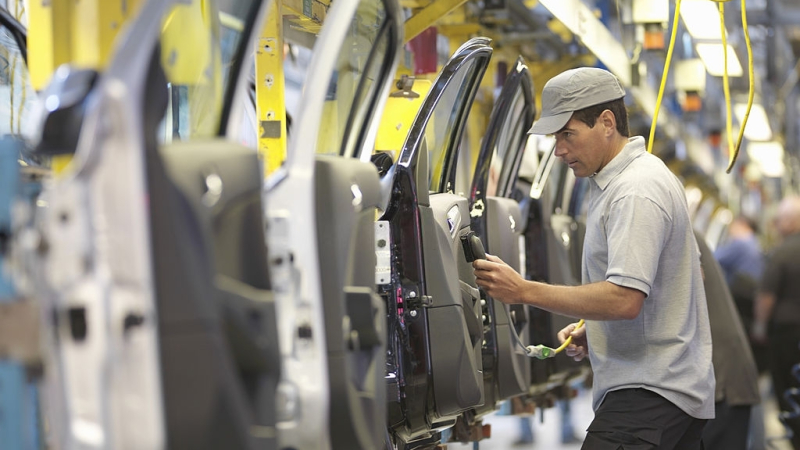The Michigan automotive sector contributes $225 billion annually to the state’s economy. | Stock Photo at Getty Images
The Michigan automotive sector contributes $225 billion annually to the state’s economy. | Stock Photo at Getty Images
As the global pandemic wreaked economic havoc worldwide, Michigan auto companies and suppliers report that revenue fell by almost 50% in the second quarter of 2020, reported Bridge Michigan.
General Motors, Ford and auto suppliers Aptiv, Gentex, Gentherm, Lear, Visteon, Meritor and Cooper Standard report that revenue fell roughly by half for the full three-month period ending July 30.
Despite rebounds as the global economy reopened later in the quarter, IHS Markit predicts a drop of 22% for light vehicle sales for the year.
Decreased revenues weren’t the only obstacles companies had to contend with within the past few months. To comply with government shutdown orders and control losses, companies stopped production, furloughed employees, changed operating models, and cut salaries, capital expenditures and overhead.
“The past several months have been some of the most challenging times in our company's history,” Roger Penske, CEO of Penske Automotive Group, told analysts on the company’s quarterly earnings call, reported by Bridge Michigan.
Some companies changed they way they did business to adapt to the unique market conditions.
The Penske Group operates over 300 dealerships in the U.S. and abroad, according to Dun & Bradstreet. For the second quarter of 2020, the company generated $45 million in net income, which is an earnings drop of 60% when compared with the $118 million the company made in 2019’s second quarter. However, unlike many other automotive firms, the company still turned a profit.
“In many respects, we've adapted the way we do business,” Penske said, according to Bridge Michigan. “Many of our employees worked remotely. We increased our digital performance rates and increased our online sales through home curbside delivery and click-and-collect initiatives.”
“Starting in late March, we began furloughing approximately 15,000 employees, 57 percent of our workforce,” he continued, according to Bridge Michigan. “We reduced [selling, general and administrative] expenses by $215 million in the quarter... We focused on liquidity and preserving cash.”
Business results improved as the quarter progressed. The Penske Group has recalled thousands of employees back to work. But as of July 1, 14% percent of its workforce remained on furlough.
Visteon CEO Sachin Lawande said the staggered reopening of the world economy made it difficult to align supply chains with market demands.
“In this uneven environment, vehicle production at top Visteon customers was down 53% year-over-year,” he said, according to Bridge Michigan.
Automotive production in China recovered to pre-COVID levels early in the second quarter and recovered at uneven rates in Europe in early May, Brazil and India by late May, and North America in early June.
Visteon cut expenses in response. “Our manufacturing costs were reduced by more than 45 percent, while gross engineering and adjusted SG&A were both down approximately 30 percent,” Lawande said, according to Bridge Michigan. “It is difficult to predict when we will be able to overcome the coronavirus, but it appears unlikely to happen this year, and we may have to live in this environment for the rest of the year.”
Visteon’s revenues have dropped 49.4% in the second quarter, and the company recorded a $45 million net loss compared to a $7 million gain in the second quarter of 2019.
All Visteon plants are currently operating, and the company is forecasting that production will be down about 15 percent in the second half of this year.


 Alerts Sign-up
Alerts Sign-up